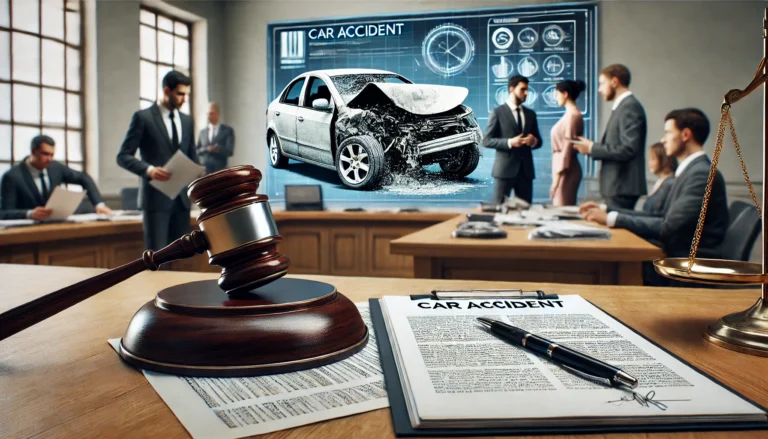Introduction To Car Accident Lawsuits
A car accident lawsuit is a legal process where someone who has been injured or experienced property damage in a car crash seeks compensation. This can involve medical expenses, lost wages, or damages to a vehicle. These lawsuits help victims recover financially after a serious accident.
Understanding your legal rights after an accident is crucial. If you are injured or facing expenses due to the accident, filing a lawsuit can hold the responsible party accountable. Knowing when to take legal action can help you receive the compensation you deserve.
When To File A Car Accident Lawsuit
You may need to file a car accident lawsuit when severe injuries or disputes with insurance arise. If medical bills are high or the insurance refuses to cover damages, legal action becomes necessary. Also, if there’s permanent disability or lost wages, a lawsuit may be needed.
Every state has a statute of limitations, which sets a deadline for filing. Generally, it’s between 2-3 years after the accident, but this varies, so it’s crucial to act quickly to protect your rights.
Determining Liability In A Car Accident
Liability in a car accident is based on who is at fault. The two main rules are contributory and comparative negligence. In contributory negligence states, if you’re even slightly at fault, you may not receive compensation. In comparative negligence states, you can still get compensation, but your share might be reduced by your percentage of fault.
Common causes of accidents leading to lawsuits include speeding, drunk driving, distracted driving, and failure to follow traffic laws.
Types Of Compensation In A Car Accident Lawsuit
In a car accident lawsuit, you can seek different types of compensation:
- Medical Expenses: This includes hospital bills, surgeries, medications, and rehabilitation.
- Property Damage: Compensation for repairs or replacement of your vehicle and any other personal property damaged in the accident.
- Lost Wages And Future Earnings: If the accident caused you to miss work or reduced your ability to earn money in the future, you can claim this loss.
- Pain And Suffering: This includes physical pain, emotional distress, and any loss of quality of life resulting from the accident.
Steps In Filing A Car Accident Lawsuit
- Hiring An Attorney: It’s vital to have an experienced car accident lawyer who understands the legal process.
- Investigation Of The Accident: Your lawyer will gather evidence like police reports, witness statements, and medical records.
- Filing A Claim With Insurance: Before going to court, you’ll likely file a claim with the at-fault party’s insurance.
- Settlement Negotiations: Often, both parties try to agree on compensation before going to trial.
- When To Go To Trial: If negotiations fail, the case moves to court, where a judge or jury decides the outcome.
The Legal Process In A Car Accident Lawsuit
The legal process involves several stages:
- Pre-Trial Steps: This includes discovery, where both sides exchange information, and depositions, where witnesses give sworn testimony. Mediation may be attempted to settle the case outside of court.
- Court Trial Process: If mediation fails, the case goes to trial. Both sides present their evidence, and a jury or judge decides fault and compensation.
- Potential Outcomes: The court may award you compensation or dismiss your case if you can’t prove fault.
Challenges And Considerations In A Car Accident Lawsuit
- Dealing With Insurance Companies: Insurance companies aim to minimize payouts, so you must be prepared to negotiate or take legal action.
- Costs Of Litigation Vs. Settling Out Of Court: Trials are costly and time-consuming. Many choose to settle for a lower amount to avoid the hassle.
- Risks Of Not Filing A Lawsuit In Time: Missing the statute of limitations means you lose your right to sue, so it’s essential to act quickly if a settlement cannot be reached.
Common Defenses In Car Accident Lawsuits
In a car accident lawsuit, the defendant may use several common defenses:
- Comparative Negligence: They argue you were partly at fault, reducing the compensation you can receive.
- Lack Of Sufficient Evidence: If there is not enough proof of their fault, the case may be dismissed.
- Pre-Existing Medical Conditions: The defendant might claim your injuries were from a previous condition, not the accident.
The Role Of Insurance In Car Accident Lawsuits
Insurance plays a major role in how car accident lawsuits are handled.
- In at-fault states, the driver who caused the accident is responsible for covering damages.
- In no-fault states, your own insurance covers certain damages regardless of fault, but you can still sue if injuries are severe.
- Uninsured/underinsured driver claims arise when the at-fault driver has no or insufficient coverage, leading to complications in settlements.
Whom Can You Sue In A Car Accident Lawsuit?
In a car accident lawsuit, you may sue various parties depending on who is responsible:
- The Negligent Driver: The person who caused the accident due to careless driving.
- A Third-Party: This could be an employer if the driver was working at the time or a vehicle manufacturer if the accident was caused by faulty parts.
- Multiple Parties: In accidents involving several vehicles, multiple drivers may share liability.
Settlements Vs. Going To Trial
In a car accident lawsuit, settling outside of court often offers faster and guaranteed results.
- Benefits of settling: Quicker resolution, lower legal costs, and less risk.
- Trial risks: While a trial could lead to a larger payout, it’s more time-consuming, expensive, and uncertain.
- Average settlement amounts vary but depend on factors like the severity of injuries, liability, and available insurance.
Final Thoughts On Car Accident Lawsuits
Filing a car accident lawsuit is a complex process that often requires legal expertise.
- Having an attorney ensures you navigate legal procedures properly and negotiate fair compensation.
- It’s also important to consider the long-term effects of an accident—financial, emotional, and physical—when deciding to pursue legal action.
Explore for more amazing content our related category.
